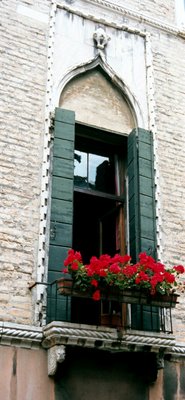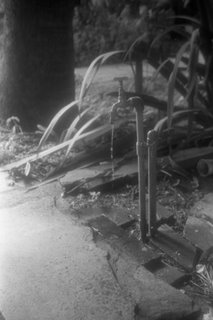
Holy Week 2006
Included in this post is an open letter sent by Poets and People of Faith to the Prime Minister of Australia before a visit from the Chinese leader in April.
Recently on the Buffalo Poetics List it was said that Americans do not have the right to criticize China's human rights record. I assert however that we can criticize both America's Human Rights record and China's. In fact it is our duty to do so because we give so much of our money to China and we buy so much from them.
This Holy Week I am thinking about a Chinese Friend. I met him in Hong Kong in 2002 during a tradeshow; I was working for a company based in China. I was invited to a prayer service in his home in Dongguan. He is a Catholic like me but the group was mixed Catholic, Protestant. I saw him later in 2002 and I brought him gifts he asked for; a Rosary, a book of Bei Dao's poetry, and a Breviery in Chinese.
Then last year I tried to contact him and there was no contact. I heard from a colleague that he has been sent away.
During this Holy Week I offer prayers and thoughts for him and his family.
Open Letter to Prime Minister John Howard, all MPs and Senators of Australia
Mar 26, 2006
34 prominent Chinese Australians and residents have written this letter to Prime Minister John Howard and the elected members of the Australian Federal Government
To the Honourable John Howard and MPs and Senators of the Commonwealth of Australia,
It is reported that China's Premier Wen Jiabao will be visiting Australia in April. As Chinese Australians and residents, we write asking you to raise the issue of the extremely severe human rights abuses in China during your contacts and meetings with Mr. Wen.
In the last few years, China's human rights situation has deteriorated dramatically, to the point where it has gone beyond what people from western democratic countries such as Australia could even imagine.
China's state security agents, plain-clothes and uniformed police and thugs hired by the CCP authorities have been, on a large scale, resorting to mafia-style methods to carry out unprecedented and inhumane persecution against a vast cross-section of the Chinese society.
This includes but is not limited to: human rights lawyers, political dissidents, people with spiritual beliefs, journalists, people who appeal to higher authorities for justice, farmers dispossessed of their land, writers and scholars, social workers, and even their relatives and friends assumed guilty by associations.
The abuses include violent attacks in public, kidnapping, establishing illegal courts, long-term illegal imprisonment, torture, confinement and harassment, intimate around-the-clock surveillance, being sent to prison without the presence of lawyers and trial procedures, skillfully designed attempts to frame and assassinate, and even cutting off communication to the outside world and giving death ultimatums, etc.
The Chinese Communist authorities' persecution against dozens of human rights lawyers such as Mr. Gao Zhisheng and Mr. Guo Feixiong is especially inhumane. In China even lawyers are persecuted, let alone other people. China's senior leaders and the departments concerned have continually and blatantly ignored such persecutions as if they don't know it at all. The strict censorship forces the media to remain silent and gagged.
The Chinese Communist authorities' savage behaviour is speeding up the pace of transforming the society into a Mafia-like one; Laws in China are merely scrap paper;Terror and fear enshroud the whole of Mainland China.
The Chinese Regime's persecution against Falun Gong, which has lasted over six years, is even more appalling. It has been confirmed by evidence that 3052 Falun Gong practitioners have been persecuted to death.
Recently the Sujiatun concentration camp in Shenyang, China was revealed to the public. It is reported that over 6000 Falun Gong practitioners had been detained in the Sujiatun concentration camp, among which some 4000 have been victims of organ harvesting for transplant operations, and many while still alive, with their bodies cremated in a large on-site incinerator.
The Chinese senior leaders have remained unusually silent and have not made any comments or declared any further investigation. The fate of the 2000 Falun Gong practitioners left is uncertain. In addition, there are countless Falun Gong practitioners still experiencing torture and forced spiritual brainwashing in the jails and labour camps in China. Their lives are at immediate risk.
The values of democracy, freedom, and human rights are the foundation of the nation of Australia. We agree with the Australian Government that Australia should develop normal trade relations with China and also hold the foundation of Australia firmly. Furthermore, we believe that it is a short-sighted and suicidal action for a free and democratic country like Australia to export uranium to a Communist totalitarian regime with a growing military strength.
The Chinese Major-General Zhu Chenghu's crazy threat of planning to launch a nuclear world war is still echoing in our ears. A brutal and sly Communist regime can never be trusted, and the nuclear crisis created by the former Soviet Union in the period of the Cold War is still fresh in our memory.
We call upon the Honourable Prime Minister and all members of the parliament of Australia, for the sake of the integrity of humanity and conscience, to pay attention to the facts of severe human rights abuses taking place in China.
We hope you can
1. Urge the Chinese Government to stop immediately, the brutal persecution against human rights lawyers, dissidents, and people with beliefs and religion;
2. Urge the Chinese Government to release over 40,000 political dissidents, prisoners of conscience and innocent people with beliefs and religion in jails.
3. Urge the Chinese Government to allow immediately an independent and authentic international organisation to carry out a thorough investigation of the Sujiatun concentration camp case.
4. Reconsider Australia's uranium deals with Communist China in light of national security issues and handle cautiously and properly relations with the Communist totalitarian government of China in the fields of politics, economics, and military co-operation in the future, while seriously considering the responsibility of long-term interest of Australia.
With high respect.
Signed by
Mr. Chen Yonglin, Human Rights Activist, former Chinese Diplomat
Prof. Yuan Hongbing, Liberalist Jurist and Writer, Editor-in-Chief of the Fire of Liberty Website;
Mr. John Liang, Vice President of the Federation for a Democratic China;
Mr. Chin Jin, Chairman of the Federation for a Democratic China, Australia
Mr. Sun Liyong, Convener of Support Network for Persecuted Political and Religious Dissidents in China
Ms. Jennifer Zeng, Freelance Writer, Author of Witnessing History, "Ambassador for World Peace" of Australia Mme. Tao Leshun, Writer, Secretary-General of Australia Liberalist Writers Association
The following individuals have authorised to have their names included in the list after being fully informed about the content of this letter.
Mr. Hao Fengjun, former Chinese State Protection Police
Mr. Jun Yang, Human Rights Activist, former Australia Chinese Students Movement Leader
Dr. Xiaogang Zhang, Software Engineer, Democracy Dissident
Dr. Jing Jiang Zhong, Electronic Engineer, Democracy Dissident
Mr. Chen Zhe, Democracy Dissident
Dr. Lucy Zhao, Vice President of Free China (Farewell to the CCP)
Mr. Yuan Tiemin, Bachelor of Laws of University of Sydney, former Lecturer of China North-West Politics and Laws University.
Dr. Huang Ping, Poet
Mr. Li Baoqing, former Researcher and Doctoral Supervisor of the Chinese Academy of Social Sciences
Mme. Liu Jinghang, former Assistant Researcher of the Chinese Academy of Social Sciences
Mr. Lu Yi, President of the Melbourne Branch of the Overseas Chinese Democracy Coalition
Mr. Zhang Weiqiang, Secretary-General of the Melbourne Branch of the Overseas Chinese Democracy Coalition
Ms. Chen Ying, Deputy Secretary-General of the Melbourne Branch of the Overseas Chinese Democracy Coalition
Mr. Ruan Jie, Deputy Secretary-General of the Alliance of the Chinese Democratic Parties
Mr. Sang Zhi, Poet
Ms. Lin Bin, Poet
Mr. Lin Xiaohui, Ph. D. Student at the University of Technology Sydney
Mr. Gao Yuan, Musician
Ms. Zhang Cuiying, Chinese Painting Artist
Mr. Liu Songfa, Geologist
Ms. Jiang Xili, Computer Engineer
Mr. Xia Jianguo, Photographer
Mr. Jiang Huijie, Human Rights Activist
Ms. Christina Xu, Executive Producer of the Sound of Hope International Radio (Australia)
Ms. Julian Hu, Representative of World Organisation to Investigate the Persecution of Falun Gong
Ms. Helen Hou, "Ambassador for World Peace" of Australia.








